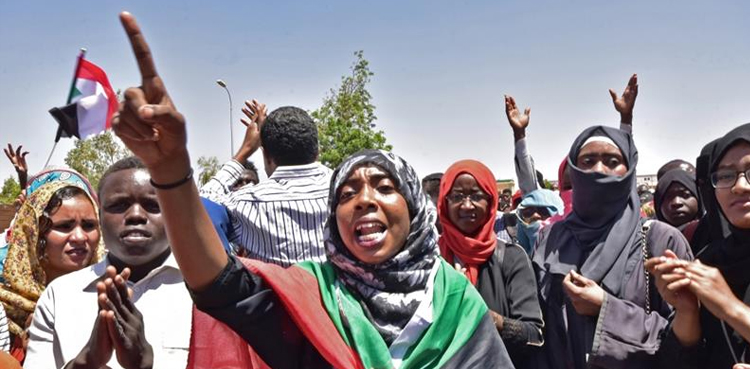
KHARTOUM: Sudan’s military rulers said Tuesday that six members of the security forces were killed during protests, as tensions mounted over the makeup of a new joint civilian-military council.
Demonstrators reinforced their barricades outside the army headquarters in Khartoum after the two sides differed in talks Monday on the number of council seats for civilians and military representatives.
The joint body is supposed to replace the military council that took power after the army ousted veteran president Omar al-Bashir on April 11 in the face of mass protests against his three-decade rule.
But the two sides are at odds over its composition, with the military pushing for a 10-member council including seven military representatives and three civilians.
Risking the anger of demonstrators, a top Sudanese general announced Tuesday that the new body would be headed by current military ruler General Abdel Fattah al-Burhan.
Protesters have called the military council headed by Burhan “a copy cat of the toppled regime”.
They want a majority of civilians on a 15-member joint council along with seven military representatives.
Adding to the deepening discord, the military council said that six security personnel were killed in clashes with protesters across the country on Monday.
Read More: Sudan protesters hail breakthrough in talks with army rulers
“In different incidents, six people from the security forces were killed and 16 wounded,” the council’s deputy chief Mohamed Hamadan Dagolo, widely known as Himeidti, said.
“There were incidents of burning of markets, looting of money,” he said, adding that protest leaders told the military council that anything happening outside the Khartoum sit-in does not represent them.
Thousands of protesters began massing outside army headquarters in the capital on April 6, demanding that the armed forces back them in ousting Bashir.
Five days later, the army took power through a transitional military council, having deposed Bashir, after months of protests that began with unrest over a tripling of bread prices.
Since then the 10-member council of generals has continued to resist calls to step down.
‘Copy cat of regime’
But in a breakthrough on Saturday, the two sides agreed to form a joint civilian-military body to pave the way for a civilian government.
The joint council would be an overall ruling body, according to protest leaders, who want a separate transitional civilian administration to run the country’s day-to-day affairs and work towards elections.
Late Monday, a Sudanese protest group said the army was trying to remove barricades and disperse the sit-in outside army headquarters, but witnesses said troops had not moved in.
“The military council is a copy cat of the toppled regime. The army is trying to disperse the sit-in by removing the barricades,” said the Sudanese Professionals Association (SPA), the group that first launched the protest movement against Bashir’s regime.
“We are calling on our people to come immediately to the sit-in area. We are calling on the revolutionaries to protect the barricades and rebuild them.”
But the council’s deputy head insisted it was “not against” the Khartoum sit-in.
“We are not against the continuation of the sit-in and we offered to help in providing support for protesters during Ramadan,” Himeidti told reporters.
Lieutenant General Salah Abdelkhalik, also a member of the ruling military council, said that the army “will never use violence against protesters”.
Witnesses at the sit-in told AFP that protesters were building up some of the makeshift roadblocks.
“These barricades are for protecting us. We don’t want any military vehicle to enter the sit-in area. We will not move until we have civilian rule,” a protester told AFP.
Some demonstrators perched on rooftops of nearby buildings to keep watch for troops, while others sat on barricades holding Sudanese flags.
The protesters have won expressions of support from Western governments for their demands.
But Sudan’s key Gulf Arab donors have backed the military council, while African states have called for more time for the army to hand power to civilians.
The post Tensions flare between Sudan military rulers, protesters appeared first on ARYNEWS.
from ARYNEWS http://bit.ly/2vtU3Bz
Comments
Post a Comment